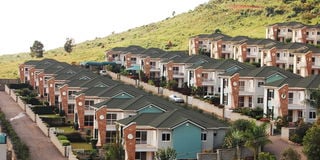Experts make case for data use in real estate

These condos in Lubowa could be perfect for the elderly. They are secured, small enough to not require so much maintenance and close to each other to make sure there is no loneliness. PHOTO/TONY MUSHOBOROZI.
What you need to know:
- Home buyers are now seek properties with amenities like swimming pools, gyms, and advanced security systems.
The trifecta of quality, accessibility, and reliability in infrastructure stands as a linchpin for a nation’s socio-economic advancement. In the case of developing countries, Uganda grapples with the task of fortifying and modernising critical facilities—be it roads, electricity networks, water supply systems, or housing amenities.
A crucial catalyst in expediting this progress is the strategic utilisation of real estate data.
“Harvested carefully and utilised strategically, real estate data can critically underpin the planning and implementation of infrastructural development in Uganda,” Mr Vicent Agaba, founder of the Association of Real Estate Agents of Uganda (AREA-Uganda), says.
Real estate data encompasses a wealth of information, spanning property values, sales, construction processes, land use, and infrastructural development.
Statista projects a compound annual growth rate of real estate in Uganda at $437 billion by 2028, up from $305 billion in 2023.
Customer preferences are reshaping the landscape, favouring contemporary and upscale properties, triggering recommendations for lavish residential and commercial constructions.
Local factors, such as a burgeoning middle class and rapid urbanisation, further sway market dynamics.
Homebuyers and tenants now seek properties with amenities like swimming pools, gyms, and advanced security systems. Commercial properties tailored to business needs, including office spaces and retail outlets, are increasingly in demand.
For Mr Joseph Wabule, a young marketer in Kampala, finding a suitable dwelling proves challenging.
“It is hard to find studio units in Kampala,” he told Saturday Monitor, “if you find one, it is too expensive, so I am resorting to any self-contained single bedroom house for rent as long as it is in a secure community.”
Such demands spur advancements in physical structures. Gated communities and housing estates are on the rise, offering a heightened sense of security and community, appealing to those seeking a cosy and secure living environment, according to Statista.
Investing in service infrastructure aligned with residential and business needs enhances Uganda’s geographical competitiveness. “By structuring urban layouts in alignment with the data accrued about the commercial and residential real estate market, the government can optimise the distribution of resources and services,” Mr Agaba notes.
Such data-driven decisions not only attract domestic and foreign investors but also ensure infrastructural development aligns with citizens’ expectations.
According to the Population Reference Bureau, Uganda’s population could double to 70 million by 2031, reaching 100 million after 2040. Approximately 78 percent of Ugandans are aged below 30.
“This is the near or far future’s working class, and, be sure, they will need advanced real estate facilities,” says Mr Bright Onapito, a data scientist.
Understanding data related to population demographics aids in enacting area-specific policies, improving accommodation, commercial, and social facilities in tune with local community lifestyles.
Additionally, Mr Agaba suggests that deciphering data patterns can help address gaps in Uganda’s housing affordability sector, a concern on its path to a middle-income status.
Businesses can benefit from real estate data-guided infrastructure development. Analytical insights into space utilisation, commercial rents, industrial properties, urban layout, and transport connectivity are invaluable for creating a conducive business environment.
From identifying optimal spaces for new ventures to planning expansions based on amenities like ample parking, real estate data supports businesses of all scales in Uganda’s active economic landscape.
Enhanced layers of depth in real estate data can also facilitate responsible and sustainable urbanisation.
As Uganda establishes 15 cities, granular insights into changing land-use patterns, population densities, and growth rates can inform conscious planning for infrastructures such as efficient transportation networks and green spaces, enhancing the quality of urban life.
Despite the critical importance of real estate data, challenges hinder its leverage in Uganda: limited data availability, poor data quality, and a lack of technical capacity for data utilisation are among the obstacles.
“Addressing these issues calls for persistent efforts and strategic partnerships among the government, real estate industry stakeholders, and international development partners focused on data collection, standardisation, and capacity-building,” notes Mr Agaba.
OUTLOOK
Real estate data paints a precise, insightful, and actionable picture of a nation’s infrastructure needs.
As Uganda continues its pursuit of accelerated infrastructural development, it is vital to strategically harness the transformative potential of real estate data. This, in turn, encourages the development of infrastructure tailored for people, elevating living standards, boosting the economy, and fostering a better life for Ugandans.




